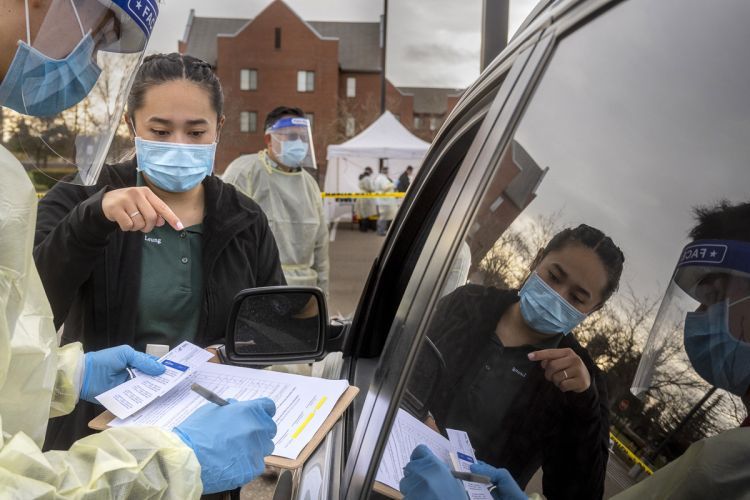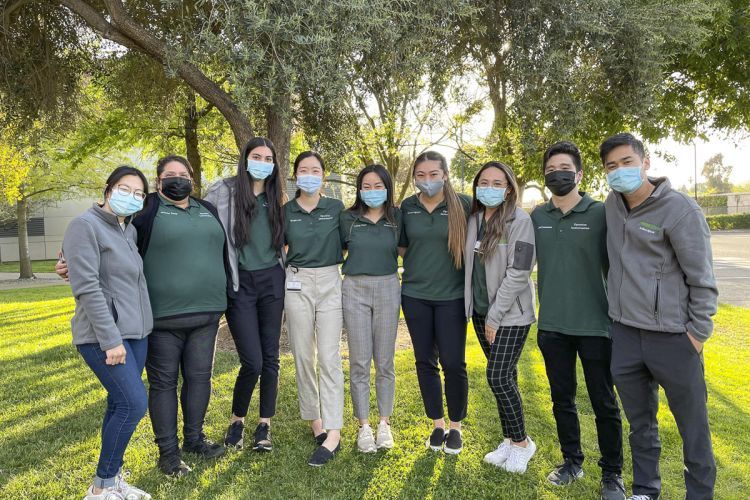Breadcrumb
Pharmacy students play a crucial role in COVID-19 vaccination efforts

University of the Pacific partnered with San Joaquin County Public Health Services to offer COVID-19 vaccination clinics on the Stockton campus. The Operation Immunization health care outreach committee led the effort to vaccinate the Pacific community as well as local community members.
In addition to their educational commitments, the four Operation Immunization co-chairs worked tirelessly behind the scenes to help plan the clinics. First-year doctor of pharmacy (PharmD) students Carissa Leung ’23 and Talar Yetenekian ’23 were supported by second-year co-chairs Kyle Vo ’22 and Woo Jin Lim ’22.
Hosting the drive-through clinics required the students to navigate a myriad of logistics, including managing the vaccine supply, designing policies and procedures, creating training modules, coordinating volunteers and handling traffic flow, while following legal requirements.
“It is about more than the one shot in that two-second time frame, it is about the whole process and remembering the patient is at the center of the process,” said Veronica T. Bandy ’00, ’08, PharmD, MS, FCPhA, FCSHP, BCACP, Operation Immunization faculty advisor, clinical professor of pharmacy practice and regional coordinator for Sacramento.
“I received the COVID-19 vaccine at one of our clinics on the Stockton campus and it filled me with pride to see our students in action.”
At first, Leung and Yetenekian were overwhelmed by the weight of responsibility and the size of the undertaking, but through the mentorship of Dr. Bandy and their fellow co-chairs, they embraced the challenge. Between January and July, Operation Immunization hosted 25 clinics and administered 7,525 vaccine doses on the Stockton campus.
“I received the COVID-19 vaccine at one of our clinics on the Stockton campus and it filled me with pride to see our students in action,” said University President Christopher Callahan. “Our outstanding students, under the guidance of dedicated faculty, navigated the complex logistics that came with planning and hosting the vaccination clinics. My heartfelt thanks to all of the volunteers who gave their time to help keep our community safe and healthy.”
The clinics also offered students a way to engage in experiential, hands-on learning at a time when classes were being held virtually. “Through these clinics, we are able to provide students with the opportunity to not only interact with patients, but also with their faculty and classmates,” said Leung.
All 600 of Pacific’s PharmD students hold intern licenses as well as a nationally recognized certification that allows them to immunize the public; the same certification held by licensed pharmacists.
“Participating in vaccination clinics really helps students mature in their role as vaccinators and helps them to become even stronger pharmacists for the future,” Dr. Bandy said. “Not only do they learn how to screen a patient to make sure that they are eligible to receive the vaccine, they learn about the monitoring process and how a person’s disease state or previous allergies affect them.”

Operation Immunization received the 2021 Student Organization of the Year Award
During a time of rapidly changing guidelines and limited vaccine supply, the strength of longstanding partnerships with local health care agencies paved the way for Pacific to host the clinics. Faculty and students also drew upon their experience organizing health care outreach events; specifically, influenza vaccination clinics. In addition, when the Pfizer-BioNTech COVID-19 vaccine was first distributed, the guidelines required the vaccine to be stored between minus 112 degrees and minus 76 degrees Fahrenheit. Provost Maria Pallavicini, PhD played a critical role in securing an ultra-cold freezer.
The clinics were a collaboration of Pacific’s three campuses and they brought together students, faculty, staff, emeriti faculty and alumni from across the University. The interprofessional teamwork of the Thomas J. Long School of Pharmacy, Arthur A. Dugoni School of Dentistry and School of Health Sciences demonstrates the necessity of partnerships between health care professionals to work together to respond to a public health crisis.
“It takes a village, and it takes the Pacific Tiger pride, in order to help end the pandemic,” Dr. Bandy said. “Our students, faculty and staff as well community volunteers who spent their weekends helping us run the COVID-19 vaccine clinics are the true heroes.”





